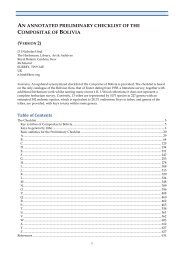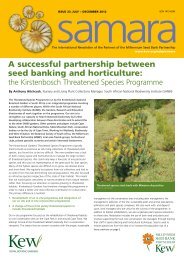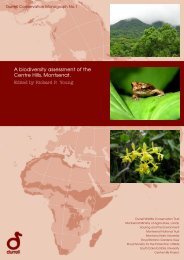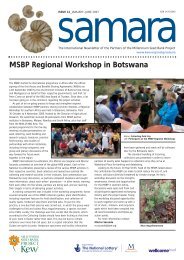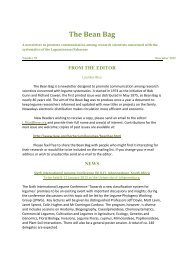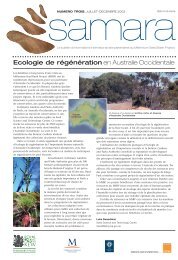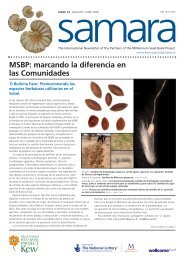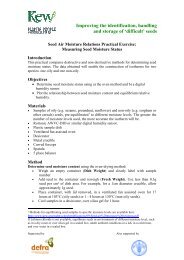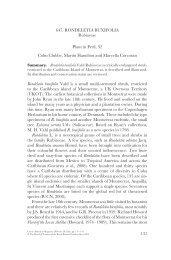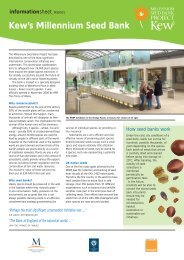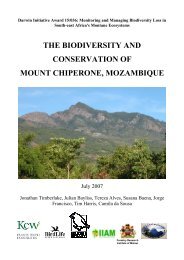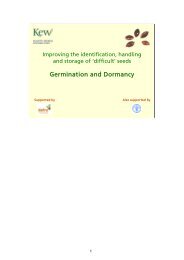Improving the identification, handling and storage of âdifficultâ seeds ...
Improving the identification, handling and storage of âdifficultâ seeds ...
Improving the identification, handling and storage of âdifficultâ seeds ...
Create successful ePaper yourself
Turn your PDF publications into a flip-book with our unique Google optimized e-Paper software.
3.4. NFCI presentation<br />
Supporting On-farm Management & Improvement<br />
<strong>of</strong> Plant Genetic Resources for Food <strong>and</strong> Agriculture (PRGRFA):<br />
Report <strong>of</strong> field projects conducted in arid <strong>and</strong> semi-arid parts <strong>of</strong> Kenya<br />
Mr. Christopher A. Nyakiti<br />
Nairobi Friends Club International (NFCI)<br />
In Kenya, <strong>the</strong> attainment <strong>of</strong> a satisfactory food security is a national priority goal. The country has<br />
made a significant progress in improving food production through modern agricultural farming<br />
methods especially in high potential agricultural regions. However, <strong>the</strong> continued drought <strong>and</strong> food<br />
shortage resulting in dependency <strong>of</strong> people in Arid <strong>and</strong> Semi-Arid L<strong>and</strong>s (ASALs) on food relief is<br />
a major concern for <strong>the</strong> government <strong>and</strong> o<strong>the</strong>r development partners alike. In order to improve <strong>the</strong><br />
level <strong>of</strong> food production <strong>and</strong> agricultural biodiversity in such marginal areas, <strong>the</strong>re is an urgent need<br />
to promote appropriate traditional farming systems aimed at maintaining, popularizing <strong>and</strong><br />
improving <strong>the</strong> accessibility <strong>of</strong> a wide range <strong>of</strong> traditional cultivars <strong>and</strong> <strong>the</strong>ir wild relatives resilience<br />
to natural hazards such as drought, pests <strong>and</strong> declining soil fertility. The major challenge <strong>the</strong>refore,<br />
is to empower smallholder farmers in enhancing <strong>the</strong>ir capacity to develop core seed collections.<br />
They also need to develop a combination <strong>of</strong> techniques for cost effective germplasm conservation<br />
<strong>and</strong> management methods that can increase <strong>the</strong> amount <strong>and</strong> quality <strong>seeds</strong> available at affordable<br />
prices, reducing losses in <strong>storage</strong> <strong>and</strong> extending <strong>the</strong> <strong>storage</strong> life <strong>of</strong> <strong>seeds</strong>.<br />
Nairobi Friends Club International (NFCI) is a Non-Governmental Organization <strong>of</strong> friends<br />
promoting Sustainable Use <strong>of</strong> Biodiversity, Community Development <strong>and</strong> Gender Equality. The<br />
organization was formed in 1995, based in Nairobi Kenya. NFCI has more than seven years<br />
experience in implementing community development projects through field surveys, capacity<br />
building <strong>and</strong> training in Rural Agriculture <strong>and</strong> Conservation <strong>and</strong> Use <strong>of</strong> Plant Genetic Resources.<br />
Through such activities, NFCI has worked in partnership with <strong>the</strong> National Genebank <strong>of</strong> Kenya<br />
(NGBK) <strong>and</strong> o<strong>the</strong>r national <strong>and</strong> research institutions in conducting <strong>the</strong> following projects:<br />
▪<br />
▪<br />
In 2001, NFCI in partnership with <strong>the</strong> NGBK carried out a study on traditional seed systems <strong>and</strong><br />
germplasm collection mission in Suba District, Kenya. The objective <strong>of</strong> <strong>the</strong> project was to study<br />
<strong>the</strong> methods used by farmers on On-farm Seed Management <strong>and</strong> Conservation with <strong>the</strong> aim <strong>of</strong><br />
developing strategies to streng<strong>the</strong>n community-based seed management in <strong>the</strong> region. The<br />
project was supported by IPGRI-SSA Germplasm Conservation Programme.<br />
In 2002, NFCI in partnership with <strong>the</strong> NGBK carried out farmer groups’ capacity building <strong>and</strong><br />
training on On-farm Seed Management <strong>and</strong> Conservation in Suba District, Kenya. The training<br />
focused on streng<strong>the</strong>ning <strong>the</strong> knowledge <strong>and</strong> skills <strong>of</strong> <strong>the</strong> smallholder farmers on Seed<br />
Production, Selection, Processing <strong>and</strong> Storage methods. The project was funded by <strong>the</strong><br />
International Development Research Centre (IDRC).<br />
▪ In 2003, NFCI received funding from Kenya Agricultural Research Institute (KARI) –<br />
Agricultural Technology <strong>and</strong> Information Response Initiative (ATIRI) to undertake capacity<br />
building <strong>and</strong> training to women groups in Limuru - Kiambu District, Kenya on African<br />
Vegetables Seed Production, Processing, Selection <strong>and</strong> Marketing. NFCI also conducted a<br />
research on African Leafy Vegetable Seed Systems in relation to Gender Issues in Suba District<br />
funded by <strong>the</strong> IPGRI – African Leafy Vegetables Programme.<br />
▪<br />
In 2004, NFCI conducted a study to assess <strong>the</strong> extent <strong>and</strong> status <strong>of</strong> informal seed security<br />
initiatives in Kenya. This project provided an overview <strong>of</strong> all key stakeholders with <strong>the</strong><br />
objective <strong>of</strong> building capacity <strong>of</strong> smallholder farmers on existing seed regulations <strong>and</strong> policies<br />
to enhance <strong>the</strong>ir participation on on-going revision <strong>of</strong> <strong>the</strong> Seeds <strong>and</strong> Plant Varieties Act (Cap<br />
326) <strong>of</strong> <strong>the</strong> Laws <strong>of</strong> Kenya. The project targeted 25 districts though <strong>the</strong> funding raised so far



